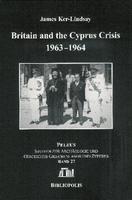|
|
more titles of the subject:
Download:
Erschienen im Jahr 2004
Letzte ISBN: 978-3-941336-23-0 This work casts light on the actions of the United Kingdom during the Cyprus Crisis of 1963-64. In particular, the volume concentrates on a very specific period of events, charting the course of British actions from the start of fighting to the moment when UN Security Council Resolution 186 passed responsibility for peacekeeping and peacemaking over to the United Nations. As is shown, Britain actually undertook several different roles during this period. On the one hand, it was a crisis manager and peacekeeper. Its timely decision, along with Greece and Turkey, to establish a peacekeeping force, the Joint Truce Force, certainly helped to limit the extent of fighting on the island, and thus reduced the chance of direct Turkish intervention. However, as this work shows, it was not an easy role to play and required a significant manpower commitment from the United Kingdom. On the other hand, Britain also tried to act as peacemaker. At first this was done informally on the island, but was later supplemented by a formal peace process in London. Unfortunately, the process failed in its objective and in doing so created a rift between Britain and the Greek Cypriots, which ended all hopes that Britain might be able to broker a compromise between the parties. It also affected Britain’s efforts to find an alternative peacekeeping force to replace the Joint Truce Force – an effort that involved looking at the Commonwealth and NATO as possible peacekeepers. In the end, the United Nations was called upon to keep the peace, a role that is forty years old. However, the book also shows that the 1963-64 Crisis is profoundly important for two other reasons. First of all, it was during these months that the Greek Cypriots were accorded international legitimacy as the Government of the Republic of Cyprus. As will be shown, this came about partly as a requirement of international peacemaking and peacekeeping. However, it also becomes clear that the actual confirmation of this recognition involved a certain amount of what the Turkish Cypriots see as betrayal – betrayal by Britain, by the United States, and, most surprisingly, by Turkey. Secondly, this period saw the acceptance by the international community of the legality of the Treaty of Guarantee. As a result, Turkey retained an internationally accepted constitutional right to intervene in the island’s affairs. This right was put into effect in 1974 after a coup ordered by the then military government in Athens overthrew Archbishop Makarios, the first president of the independent state. As a result the island was divided and the more modern understanding of the ‘Cyprus Problem’ was created. Drawing on official British government documents and interviews with many of the protagonists of the period, this work is the first in-depth study of Britain’s leading role during this critically important juncture in the modern history of Cyprus. |






